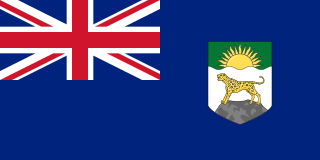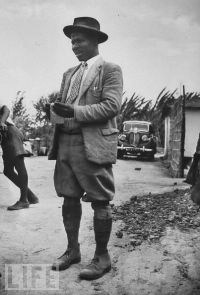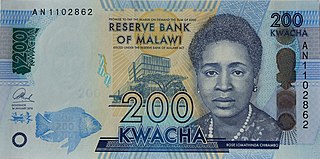Related Research Articles

Nyasaland was a British protectorate located in Africa that was established in 1907 when the former British Central Africa Protectorate changed its name. Between 1953 and 1963, Nyasaland was part of the Federation of Rhodesia and Nyasaland. After the Federation was dissolved, Nyasaland became independent from Britain on 6 July 1964 and was renamed Malawi.

Reverend John Chilembwe was a Baptist pastor and educator, who trained as a minister in the United States, returning to Nyasaland in 1901. He was an early figure in the resistance to colonialism in Nyasaland (Malawi), opposing both the treatment of Africans working in agriculture on European-owned plantations and the colonial government's failure to promote the social and political advancement of Africans. Soon after the outbreak of the First World War, Chilembwe organised an unsuccessful uprising against colonial rule. Today, Chilembwe is celebrated as a hero of independence, and John Chilembwe Day is observed annually on 15 January in Malawi.

The Chilembwe uprising was a rebellion against British colonial rule in Nyasaland which took place in January 1915. It was led by John Chilembwe, an American-educated Baptist minister. Based around his Church in the village of Mbombwe in the south-east of the protectorate, the leaders of the revolt were mainly from an emerging black middle class. They were motivated by grievances against the colonial system including forced labour, racial discrimination, and new demands imposed on the indigenous population following the outbreak of World War I.
The Nyasaland African Congress (NAC) was an organisation that evolved into a political party in Nyasaland during the colonial period. The NAC was suppressed in 1959, but was succeeded in 1960 by the Malawi Congress Party, which went to on decisively win the first universal suffrage elections in 1961, and to lead the country to independence as Malawi in 1964.
Henry Masauko Blasius Chipembere was a Malawian nationalist politician who played a significant role in bringing independence from colonial rule to his native country, formerly known as Nyasaland. From an early age Chipembere was a strong believer in natural justice and, on his return in 1954 from university in South Africa, he joined his country’s independence struggle as a nationalist strategist and spokesman. In 1957, considering that the independence movement need such a strong leader similar to Kwame Nkrumah, and considering himself too young for this task, he joined with other young nationalists in inviting Hastings Kamuzu Banda to return to Nyasaland as the movement's leader.
Orton Chirwa was a lawyer and political leader in colonial Nyasaland and after independence became Malawi's Minister of Justice and Attorney General. After a dispute with Malawi's autocratic President Hastings Kamuzu Banda, he and his wife Vera were exiled. After being kidnapped abroad they were tried in Malawi on charges of treason and sentenced to death. Amnesty International named the couple prisoners of conscience. After spending nearly eleven years on death row in Malawi, Orton Chirwa died in prison on 20 October 1992.

James Frederick Sangala was a founding member of the Nyasaland African Congress during the period of British colonial rule. Sangala was given the nickname "Pyagusi", which means "one who perseveres".
Levi Zililo Mumba was a leading local politician and the first President of the Nyasaland African Congress (NAC) during the period of British colonial rule in Nyasaland, which became the independent state of Malawi in 1964. Mumba was probably the most important figure in the development of Malawi politics between World War I and World War II.
Thamar Dillon Thomas Banda ("TDT") was a politician in Nyasaland in the years prior to independence. He was President-General of the Nyasaland African Congress (NAC) from 1957 to 1958, and founded the Congress Liberation Party in 1959.
Charles Jameson Matinga was a politician in Nyasaland before the colony obtained independence from the British.

Rose Lomathinda Chibambo was a prominent politician in the British Protectorate of Nyasaland in the years leading up to independence as the state of Malawi in 1964, and immediately after.

Sir Geoffrey Francis Taylor Colby was a British colonial administrator who was Governor of the protectorate of Nyasaland between 1948 and 1956. He fought unsuccessfully against creation of the Federation of Rhodesia and Nyasaland.
Sir Edmund Charles Smith Richards (1889-1955) was a British colonial administrator who was Resident Commissioner of Basutoland from 1935 to 1942 and Governor of Nyasaland from 1942 to 1947.

General elections were held for the first time in Nyasaland on 15 March 1956.
The Armitage Report was a report into the actions of the Nyasaland government in declaring a State of Emergency in March 1959 and actions of the police and troops in the aftermath of that declaration. It was supposed to have been a despatch prepared in Nyasaland by the Governor of that protectorate, Robert Perceval Armitage, but was in fact prepared in London by a working party that included Armitage, British government ministers and senior Colonial Office officials, in an attempt to counteract various criticisms contained in the Report of the Devlin Commission. Both reports accepted that a State of Emergency was necessary in view of the level of unrest in Nyasaland, but the Armitage Report approved of the subsequent actions of the police and troops, whereas the Devlin Report criticised their illegal use of force and stigmatised the Nyasaland government's suppression of criticism as justifying it being called a "police state". Although the Armitage Report was used by the government of the day to discredit the Devlin Report initially, and to justify its rejection of many of the Devlin Commission's findings, in the longer term the Devlin Report helped to convince the British Government that the Federation of Rhodesia and Nyasaland was not acceptable to its African majority and should be dissolved. Devlin was vindicated and approached for advice on constitutional change, but Armitage was seen as an obstacle to progress and asked to leave Nyasaland prematurely.

The cabinet crisis of 1964 in Malawi occurred in August and September 1964 shortly after independence when, after an unresolved confrontation between the Prime Minister, Hastings Banda and the cabinet ministers present on 26 August 1964, three ministers and a parliamentary secretary were dismissed on 7 September. These dismissals were followed by the resignations of three more cabinet ministers and another parliamentary secretary, in sympathy with those dismissed. Initially, this only left the President and one other minister in post, although one of those who had resigned rescinded his resignation within a few hours. The reasons that the ex-ministers put forward for the confrontation and subsequent resignations were the autocratic attitude of Banda, who failed to consult other ministers and kept power in his own hands, his insistence on maintaining diplomatic relations with South Africa and Portugal and a number of domestic austerity measures. It is unclear whether the former ministers intended to remove Banda entirely, to reduce his role to that of a non-executive figurehead or simply to force him to recognise collective cabinet responsibility. Banda seized the initiative, firstly, by dismissing some of the dissidents rather than negotiating, and secondly, by holding a debate on a motion of confidence on 8 and 9 September 1964. As the result of the debate was an overwhelming vote of confidence, Banda declined to reinstate any of the ministers or offer them any other posts, despite the urging of the Governor-General to compromise. After some unrest, and clashes between supporters of the ex-ministers and of Banda, most of the former left Malawi in October with their families and leading supporters, for Zambia or Tanzania. One ex-minister, Henry Chipembere went into hiding inside Malawi and, in February 1965 led a small, unsuccessful armed uprising. After its failure, he was able to arrange for his transfer to the USA. Another ex-minister, Yatuta Chisiza, organised an even smaller incursion from Mozambique in 1967, in which he was killed. Several of the former ministers died in exile or, in the case of Orton Chirwa in a Malawian jail, but some survived to return to Malawi after Banda was deposed and to return to public life.
Augustine Bwanausi was born in Malawi, then called Nyasaland, in 1930 and trained as a science teacher, but was also politically active in the Nyasaland African Congress, campaigning for the end of colonial rule. In March 1959, a State of Emergency was declared, and Bwanausi was arrested as a leading Congress member and detained until 1960. On his release, he joined the Malawi Congress Party and in 1961 was elected to the Legislative Council, becoming Minister of Internal Affairs and Development in the same year. In 1963, he became Minister of Works. In 1964, there was a confrontation between Banda and most of his ministers, which led to the sacking of Bwanausi and two of his cabinet colleagues in September 1964. Three other cabinet ministers resigned in sympathy, and although Banda was willingness to re-instate Bwanausi and one or two other ministers, their insistence on all be reinstated ended any hope of a reconciliation. In October 1964, Bwanausi left Malawi for Zambia, where he resumed teaching, and was active in Malawian exile politics until his death in a car accident in 1973.
Operation Sunrise was the name given to a police and military action conducted by the authorities in the Central African protectorate of Nyasaland which started on 3 March 1959, initially to detain and intern 350 individuals who were considered a potential threat to law and order in anticipation of the declaration of a State of Emergency. Although it is sometimes considered to involve only the incidents of 3 March, the Devlin Commission report is clear that it was one of two distinct operations by the security forces, reinforced from outside Nyasaland, involving the arrest and detention members of the Nyasaland African Congress. It involved not only those members of Congress initially arrested, but others arrested and detained without trial in the course of the emergency. The operation was described in some detail in the Devlin Commission report and that account has been amplified by Colonial Office documents not made available to the Devlin Commission.
George Simeon Mwase was a government clerk and later businessman and politician in colonial Nyasaland. He became politically active in the 1920s under the influence of the ideas of Marcus Garvey and his "Africa for the Africans" movement, and was instrumental in founding the Central Province Native Association in 1927. Mwase joined the Nyasaland African Congress (NAC) in 1944, soon after its formation, and later participated in its executive. By the late 1950s, the gradualism of Mwase and many of his contemporaries was rejected by a younger generation of more radical NAC members. He was marginalised and left the NAC and became a supporter of the Federation of Rhodesia and Nyasaland.
The Nyasaland Emergency 1959 was a state of emergency in the protectorate of Nyasaland, which was declared by its governor, Sir Robert Armitage on 3 March 1959 and which ended on 16 June 1960. Under the emergency powers that operated during the Emergency, over 1,300 members or supporters of the Nyasaland African Congress (Congress) were detained without trial, and most of the party's leaders including its president, Dr. Hastings Banda, were imprisoned in Southern Rhodesia after being arrested on 3 March. Many other Africans were jailed for offences related to the Emergency, including rioting and criminal damage. In the week before the Emergency was declared and during its first month, over 50 Africans were killed and many more wounded by the colonial security forces, which included many European troops from Southern Rhodesia. Others were beaten by troops or armed police or had their huts destroyed and their property seized during punitive operations undertaken during the Emergency.
References
- 1 2 Power 2010, pp. 57.
- ↑ Hill & Garvey 2006, pp. lxviii.
- ↑ Rotberg 1965, pp. 123.
- ↑ L'Hoiry 1988, pp. 106.
- 1 2 Ross 2009, pp. 69.
- ↑ Baker 1994, pp. 294.
- ↑ Baker 1994, pp. 317.
- ↑ Power 2010, pp. 76-77.
- ↑ L'Hoiry 1988, pp. 108.
- ↑ L'Hoiry 1988, pp. 109.
- ↑ Baker 2006, pp. 14.
- ↑ Murphy 2005, pp. 14.
- ↑ Baker 2001, pp. 14.
- ↑ Power 2010, pp. 180.
Sources
- Baker, Colin (1994). Development governor: a biography of Sir Geoffrey Colby. British Academic Press. ISBN 1-85043-616-9.
- Baker, Colin (2001). Revolt of the ministers: the Malawi cabinet crisis, 1964-1965. I.B.Tauris. ISBN 1-86064-642-5.
- Baker, Colin (2006). Chipembere: the missing years. African Books Collective. ISBN 99908-76-33-9.
- Hill, Robert A.; Garvey, Marcus (2006). The Marcus Garvey and Universal Negro Improvement Association Papers: Africa for the Africans, 1923-1945. University of California Press. ISBN 0-520-24732-9.
- L'Hoiry, Philippe (1988). Le Malaŵi (in French). KARTHALA Editions. ISBN 2-86537-205-7.
- Murphy, Philip (2005). Central Africa: Crisis and dissolution, 1959-1965. The Stationery Office. ISBN 0-11-290587-0.
- Power, Joey (2010). Political culture and nationalism in Malawi: building Kwacha. University Rochester Press. ISBN 978-1-58046-310-2.
- Ross, Andrew C. (2009). Colonialism to cabinet crisis: a political history of Malawi. African Books Collective. ISBN 978-99908-87-75-4.
- Rotberg, Robert I. (1965). The rise of nationalism in Central Africa: the making of Malawi and Zambia, 1873-1964 . Harvard University Press. p. 123. ISBN 0-674-77191-5.